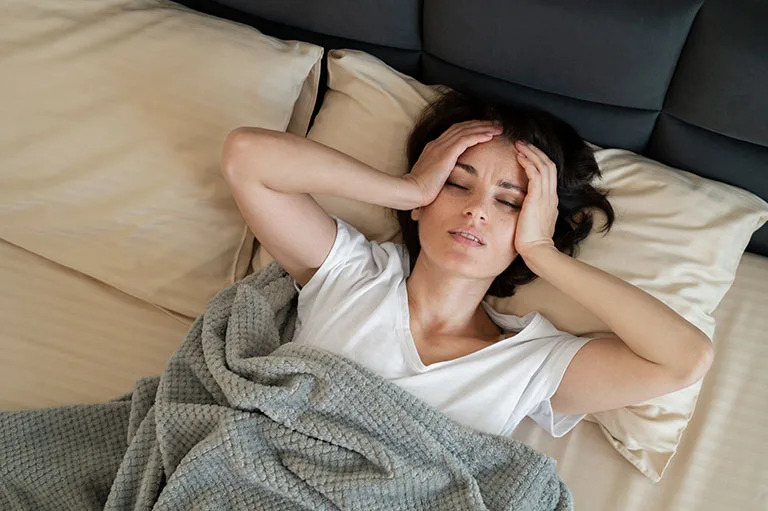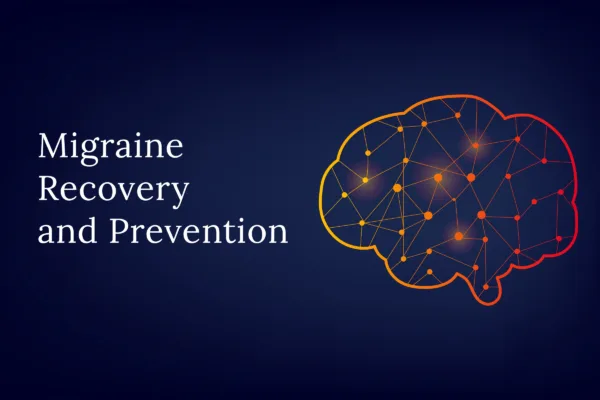There is a two-way relationship between quality of sleep and migraines. In other words, migraines can affect sleep, and sleep can affect migraines. The American Migraine Foundation noted that those suffering from migraines were two to eight times more likely to have problems with their sleep habits. Additionally, studies have shown that those who had sleep disorders were more likely to experience frequent and severe migraine episodes.
Sleep is an integral part of our day-to-day function as it helps our body reset and prepare for the activities of the day. Migraine, on the other hand, is a severe headache that can affect the quality of a person’s life.
In this article, we will be discussing the relationship between sleep and migraines, and how we can help you manage migraines and get better sleep.
How do migraines affect sleep?
Migraine headaches have a negative impact on sleep. Research has shown that the majority of persons with chronic migraines have sleep disorders like insomnia.
Common sleep disorders associated with migraines include:
Insomnia
This is described as difficulty initiating sleep or staying asleep for long periods. Insomnia is the most common sleep disorder associated with migraines.
Obstructive sleep apnea
This is a disorder associated with migraines where a person has difficulty breathing while sleeping. Sleep apnea may occur for short periods during sleep, disrupting your sleep cycle and causing headaches on waking up (morning headaches).
Parasomnia
This is a group of sleep disorders such as nightmares and making involuntary movements during sleep (like sleepwalking). Parasomnia has been seen to occur more frequently in persons suffering from migraines, and as a result, leads to an overall reduction in the quality of sleep.
Narcolepsy
This is a condition where the brain is unable to control the sleep-wake cycle, and as a result causes a person to fall asleep more frequently than usual, affecting the person’s productivity and quality of life. This condition was seen in a study to be more common among those with migraines.
Bruxism
This is a condition where a person grinds or clenches their teeth, and it can occur while asleep. Bruxism has been shown to occur with migraines and can affect the quality of sleep.
How does sleep affect migraines?
Poor quality of sleep in itself is a trigger for migraines. This means not having enough sleep can trigger migraine attacks.
A study carried out in 2019 revealed that psychological/behavioral sleep treatments significantly reduced the frequency and intensity of headaches among adolescents. Other studies have shown that sleep deprivation was also seen to trigger the pain receptors responsible for migraine headaches.
Tips for better sleep
Sleep is not just a luxury; it’s a fundamental pillar of our well-being. Getting enough sleep is important, especially if you suffer from migraine headaches.
Here are tips to help you get better sleep:
Establish a Consistent Sleep Schedule:
Your body thrives on routine, so aim to go to bed and wake up at the same time every day, even on weekends. Consistency helps regulate your body’s internal clock, making it easier to fall asleep and wake up naturally.
Create a Relaxing Bedtime Routine:
Wind down before bed with calming activities such as reading, gentle stretching, or taking a warm bath. Avoid stimulating activities or screens (such as smartphones or computers) that can interfere with your ability to relax and unwind.
Design a Comfortable Sleep Environment:
Make your bedroom a sanctuary for sleep by ensuring it’s cool, dark, and quiet. Invest in a comfortable mattress and pillows that support your body’s natural alignment, and consider using blackout curtains or white noise machines to block out any distractions.
Monitor Your Caffeine and Alcohol Intake:
Limit caffeine and alcohol consumption, especially in the hours leading up to bedtime. These substances can disrupt your sleep cycle and make it harder to fall asleep or stay asleep throughout the night.
Practice Stress Management Techniques:
Stress and anxiety can take a toll on your sleep quality. Incorporate relaxation techniques such as deep breathing, meditation, or progressive muscle relaxation into your daily routine to help calm your mind and prepare for restful sleep.
Watch Your Diet:
Avoid heavy meals, spicy foods, and excessive liquids close to bedtime, as these can cause discomfort or disruptions in your sleep. Opt for light, easily digestible snacks if you’re hungry before bed.
Stay Active:
Regular physical activity can promote better sleep, but try to avoid vigorous exercise too close to bedtime, as it may energize you and make it harder to wind down.
Seek Professional Help if Needed:
If you’ve tried these tips and still struggle with sleep, don’t hesitate to reach out to a healthcare professional. They can help identify any underlying issues contributing to your sleep difficulties and develop a personalized treatment plan to address them.
Migraine relief therapies
Therapies to help relieve migraines include:
Medication Management:
Traditional migraine medications, including over-the-counter pain relievers, prescription drugs and IV therapy, remain a cornerstone of migraine management. These medications, such as triptans, NSAIDs, and preventive medications such as Botox, aim to alleviate pain, reduce inflammation, and prevent migraine attacks before they occur.
Lifestyle Modifications:
Simple yet impactful lifestyle changes can play a significant role in managing migraines. This includes maintaining a consistent sleep schedule, managing stress through relaxation techniques or therapy, staying hydrated, and adopting a balanced diet rich in migraine-friendly foods while avoiding known triggers.
Acupuncture and Massage Therapy:
Alternative therapies like acupuncture and massage therapy have gained recognition for their potential in alleviating migraine symptoms. These modalities focus on stimulating specific pressure points or manipulating soft tissues to reduce pain and promote overall relaxation.
Interventional Procedures:
For individuals with severe and refractory migraines, interventional procedures such as nerve blocks, trigger point injections, or occipital nerve stimulation may offer targeted relief by interrupting pain signals or modulating nerve activity.
Conclusion
Sleep disorders and migraines are closely related, as one triggers the other. Understanding the link between sleep and migraine is the first step towards managing migraine headaches and improving overall quality of life.


















